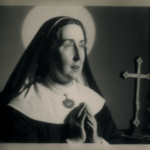Sts. Perpetua and Felicity
Sts. Perpetua and Felicity
When they lived:
Sts. Perpetua and Felicity lived during the early years of the 3rd century AD, around 203-206 AD.
Where they lived:
They lived in Carthage, a prominent city in the Roman province of Africa (modern-day Tunisia), which was a thriving center of culture and commerce during that era.
Notable world events during the time of their life:
- The Severan Dynasty: During their lifetime, the Roman Empire was under the rule of the Severan dynasty. This period saw significant political and military developments, including the expansion of the Roman Empire’s eastern territories.
- Persecution of Christians: Sts. Perpetua and Felicity lived during a time when the Roman Empire sporadically persecuted Christians. The reasons for this persecution varied, but it marked a significant challenge for early Christians and is central to their story.
- Scientific Advancements: The 3rd century was a time of growth in various fields of knowledge. Galen, a famous physician, was active during this era and made substantial contributions to the field of medicine.
- Crisis of the Third Century: This period witnessed a series of crises in the Roman Empire, including economic instability, military conflicts, and political turmoil. It set the stage for the eventual division of the empire into the Eastern and Western Roman Empires.
- Emergence of New Philosophical Schools: In the intellectual sphere, philosophers like Plotinus were developing new schools of thought, such as Neoplatonism, which would have a lasting impact on Western philosophy.
- Cultural Flourishing: Despite the challenges, the 3rd century also witnessed the continuation of classical art, literature, and culture. The works of notable figures like Origen, a Christian theologian, and Tertullian, a prolific early Christian writer, added to the cultural landscape.
Their Patronage:
Sts. Perpetua and Felicity are revered as patron saints of a variety of causes, each with its unique and inspiring symbolism:
- Martyrs and Persecuted Christians: They are foremost patron saints of martyrs and persecuted Christians, symbolizing unwavering faith and courage in the face of adversity.
- Mothers and Pregnant Women: St. Felicity is especially invoked by expectant mothers, symbolizing the strength of motherhood and the protective care of God during pregnancy.
- Nursing Mothers: St. Perpetua is associated with nursing mothers, highlighting her role as a spiritual mother to her fellow Christians and her dedication to nurturing faith.
- Catechumens and Converts: They are also patrons of catechumens, those undergoing religious instruction, and converts to Christianity. Their story of conversion and martyrdom serves as an inspiration to those on their journey to faith.
The story of Sts. Perpetua and Felicity is a timeless tale of faith, resilience, and the triumph of the human spirit, set against the backdrop of a tumultuous period in history. Their patronage continues to inspire individuals facing various challenges and seeking spiritual guidance today.
Called by What They Are, Christians
There are no existing records about the birth and early lives of these holy and courageous women. However, tradition and some writings, especially the diary of no less than Perpetua herself, depict the exemplary lives of these two martyrs. Perpetua was a young, beautiful, and well-educated noblewoman from Carthage in North Africa. She was the mother of an infant son and a chronicler of the persecution of Christians by Emperor Septimus Severus. Perpetua’s mother was a Christian and her father a pagan.
In spite of the dangers of persecution and death, Perpetua, Felicity, a slave woman who was pregnant at the time, and three other companions, Revocatus, Secundulus, and Saturninus, refused to deny and renounce their Christian faith. Because of this, all of them were arrested and imprisoned. Before their arrest, Perpetua and Felicity had been studying the Scriptures and getting ready to be baptized. Inside the prison, they were baptized by their teacher, who was also arrested and imprisoned with them. Inspired by their steadfast faith, their prison warden was converted to it.
A few days before the games began, Felicity gave birth to a daughter. While waiting for the verdict, Perpetua wrote what would be called “The Diary of Perpetua” later on. The day before the games, Perpetua’s record of her trial and imprisonment ended. She wrote: “Of what was done in the games themselves, let him write who will.” An eyewitness finished this diary.
Joyful Christians, Glorious Martyrs
Perpetua and Felicity were sentenced to death as punishment for professing the name of Christ and refusing to renounce the Christian faith. Despite the impending death they were about to face, they remained serene in the face of their fate, filled with God’s peace in their hearts. Perpetua and Felicity were thrown into an arena of wild animals. However, they were not killed. In order to satisfy the bloodthirsty audience, the emperor Severus commanded that they be put to death by the sword. Let us read a portion of the revered From the story of the death of the holy martyrs of Carthage (from the Office of Readings, Memorial of Sts. Perpetua and Felicity):
“The day of the martyrs’ victory dawned. They marched from their cells into the amphitheater, as if into heaven, with cheerful looks and graceful bearing. If they trembled, it was for joy and not for fear.
Perpetua was the first to be thrown down, and she fell prostrate. She got up and, seeing that Felicity was prostrate, went over and reached out her hand to her and lifted her up. Both stood up together.
There, Perpetua was welcomed by a catechumen named Rusticus. Rousing herself as if from sleep (so deeply had she been in spiritual ecstasy), she began to look around. To everyone’s amazement, she said, “When are we going to be led to the beast?” When she heard that it had already happened, she did not at first believe it until she saw the marks of violence on her body and her clothing. Then she beckoned to her brother and the catechumen and addressed them in these words: ‘Stand firm in faith, love one another, and do not be tempted to do anything wrong because of our sufferings.’…
The people, however, had demanded that the martyrs be led to the middle of the amphitheater. They wanted to see the sword thrust into the bodies of the victims, so that their eyes might share in the slaughter. Without being asked, they went where the people wanted them to go, but first they kissed one another to complete their witness with the customary kiss of peace.
The others stood motionless and received the deathblow in silence, especially Saturus, who had gone up first and was first to die; he was helping Perpetua. But Perpetua, so that she might experience the pain more deeply, rejoiced over her broken body and guided the shaking hand of the inexperienced gladiator to her throat. Such a woman, one before whom the unclean spirit trembled, could perhaps not have been killed had she herself not willed it.
Bravest and happiest martyrs! You were called and chosen for the glory of our Lord Jesus Christ.”
Indeed, they gave profound witness to what they were—Christians—even until the last minute. Their birth into eternal life was in the year 203. Their feast day is March 7.
5 Interesting Facts About Sts. Perpetua and Felicity
- Sts. Perpetua and Felicity are the patron saints of mothers, expectant mothers, ranchers, and butchers.
- The names of Sts. Perpetua and Felicity are mentioned in the Roman Canon (Eucharistic Prayer I).
- The day before their deaths, Perpetua had a vision of a golden ladder reaching up to heaven, with various weapons on the side and a dragon below. Perpetua climbed the ladder and reached the top, where she saw a beautiful garden and a tall man milking sheep. The man welcomed her and gave her some of the curds from the milk.
- Sts. Perpetua and Felicity are venerated not just in the Roman Catholic Church but also in Eastern Orthodox Churches, Oriental Orthodox Churches, the Anglican Communion, and the Lutheran Church.
- A magnificent basilica was later erected over the tomb of the martyrs in Carthage, where an ancient inscription bearing the names of Perpetua and Felicity has been found.
Prayer to Sts. Perpetua and Felicity
O God, at the urging of whose love the Martyrs Saints Perpetua and Felicity defied their persecutors and overcame the torment of death, grant, we ask, by their prayers, that we may ever grow in your love. Through our Lord Jesus Christ, your Son, who lives and reigns with you in the unity of the Holy Spirit, one God, for ever and ever Amen.



